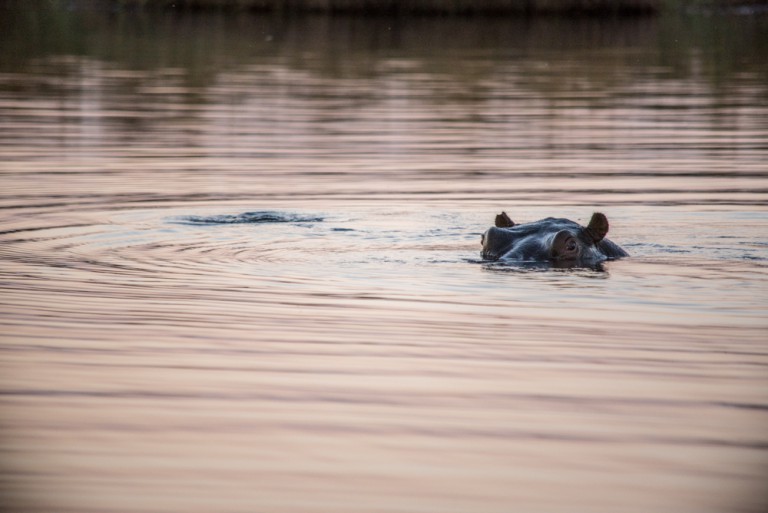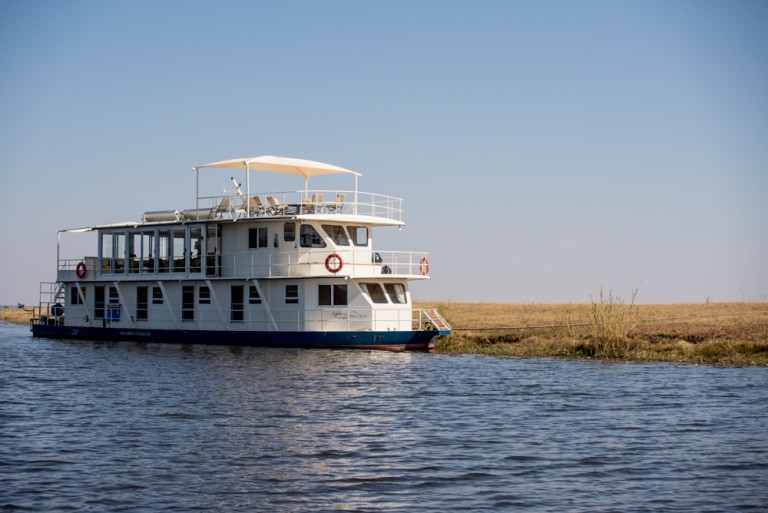I’ve always believed the best way to experience the wildlife of Chobe National Park is by boat, but some boats are better than others. Especially if those boats are Pangolin Photo Boats equipped with lekker zoom lenses and a knowledgeable guide.
For our October 2015 issue, fellow travel writer Vuyi Qubeka and I explored the elephant-thronging Zambezi Region and found life clung to the rivers. Beginning in the west, our trip ended at the eastern-most point of the formerly-named Caprivi Strip where the Chobe River meets the mighty Zambezi. Here, you can hop on the best wildlife-viewing vessels on the river – the Pangolin Photo Boat Safari.
It’s a pricey excursion at $120 (roughly R1600) a person, but its worth every single cent. Here’s why:
1. Animal behaviour

Bee-eater in flight, focusing on the branch.
There’s nothing more valuable than insider knowledge. Having spent several hours and days on the river, Pangolin guides get to know its inhabitants. For example, bee-eaters tend to favour a certain spot so while it is hunting and moving very quickly catching bees, our guide advised us to train our focus on the branch because it was likely it would return to its favourite spot to munch its catch.
She was right. I give you, bee-eater with bee:

2. Photographic advice
To make the most of great lighting, boats depart twice a day. The morning cruise is usually an early one – at around 6am – and the afternoon safari departs at 3pm, returning at sunset.

Even if you have never used a camera before you can go on this trip. The guide will teach you about ISO, how to shoot, the best place to focus and continually reviews your photographs to help you keep them sharp and well-adjusted.
If you have your own camera, you can simply attach one of the Pangolin base plates to your gear.
3. Professional gear

Vuyi gets into the swing of things with the specially-designed swivel chair and multi-directional tripod.
All boats hold eight clients and use Nikon D7000 cameras fitted with Sigma 150-500mm lenses that’ll get you that close-cropped shot.
The seats, tripods and perfectly stable hull took some time to perfect. Each seat rotates a full 360 degrees and the mounting is based on a lightweight machine gun mounting used by the South African army. The mounting design is very simple and effective and moves effortlessly.
Also, soft drinks, local beers and wines are offered in the afternoon – beer is gear right?
4. Local knowledge

The beautiful African Skimmer.
On this ride, the photographers are priority. Drivers are not only trained to drive smoothly – which they expertly do – but they can manoeuvre the boat so all on board can get the shot. Engines are also cut to reduce vibrations which in turn improves the sharpness of your photographs.

The smooth smooth sailing of the Pangolin drivers.
Drivers are usually locals who know the river intimately. They know where animals and birds like to hang out, which perches they favour, which rocks the water monitors sun themselves on and seasonal shifts that bring new species like the African skimmer. We were lucky to see a few because they only visit when water levels are low in winter. Only 1000 of these unusual birds are found in Southern Africa, specifically on the banks of the Chobe and Zambezi Rivers where they are dependent on the exposed sandbanks to roost and breed.
These knowledgeable guides bring a great element to the Pangolin Photo Safari Boat as they point out smaller wildlife sighting you may otherwise overlook.

A Woodlands Kingfishers poses on a tree stump.
5.Get eye to eye with a leopard

We spotted this leopard lounging next to the river in the Chobe National Park.
This guy! Man, we were exceptionally lucky here as the Pangolin team hadn’t had any leopard sightings for several months. Just as the sun hit the horizon he cruised to the riverside for a drink and a scout, then settled like a king underneath this log. For me, this one special sighting (on top of all the others) really drove the experience home – what an extraordinary place the Chobe River is.
6. Photos like these

Eye level photos are not something you get very often. Being on the river allows you to get low and the boat has a padded, low-level edge which you can balance your camera on to get wonderful new angles. At the end of the three-hour trip you take your storage card home with you filled with memories.

Lower to the water, the Pangolin Photo Safari allows for great perspective.




Trying to get different elephant angles.

Buffalo slosh around the shoreline and by boat you can get pretty close.

Our Leopard stops for a scout around.

The easily recognisable Lilac-breasted Roller.


7. The Pangolin Voyager
Pangolin has also recently acquired a house boat dubbed the Pangolin Voyager so you can choose to live on the river or join one of their photographic workshops.




Find out more in our October 2015 issue.
You may also like
Related Posts
Wildlife photographer, Sam Rowley, captured a remarkable shot of two mice brawling on the London...
read more
This year's winners of The British Ecological Society's 'Capturing Ecology' photographic competition have been announced....
read more
We picked the brain of budding teen photographer Branson Meaker, whose highly commended Botswana wildlife...
read more